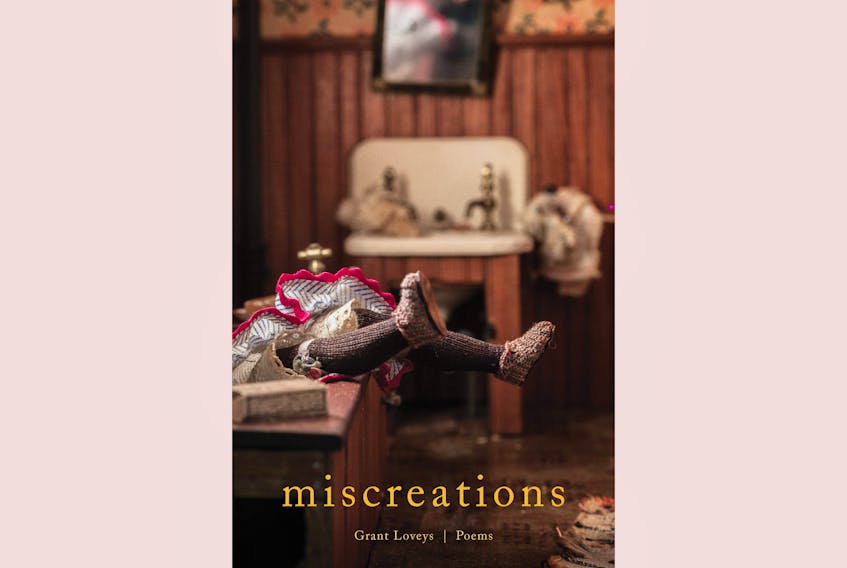This is Grant Lovey’s second collection, a followup to “Our Gleaming Bones Unrobed.” It contains about 48 poems, each running a page or two.
Remember the five poetic elements from high school English class? These are imagery, rhythm/rhyme, sound, density, and line. Either Loveys paid lots of attention to his teachers, or has solid poetic instincts, or possible some combination of both, for he’s built these into the structure of his work here.

Under “Entropy,” “Fire soon strolled down our produce aisle, / prodding our bruises, squeezing us out / of our houses. We were unbelievably ripe. / It knew exactly where to hurt us.”
Loveys’ poetry takes flight in unexpected visual tacks. And yet there’s a neat nuts-and-bolts to it amidst the unexpected symbolism. The verbs are very physical, even punchy: “prodding,” squeezing.”
This continues in “Mongrel in a Car Park” where “The dark years come drooling,” “a league of suited / men and women breathe champagne”; “There is beauty even in mugshots” “And redemption / in the fur of my fur, / the weight at my waist.”
One poem is set in the porch of a shopping mall. Another un-spirals through winter. A third is paced by digging a hole.
In “Magpies,” “The biggest of them bobbing on wire legs / black wings half-spread, then held close / to a body slick and shining as if it had been greased” clocks and catches its prey: “Released, the ant tumbles into a void / as black as bloodied hearts, / blacker.” The beat is embedded in the vowels and consonants.
There’s the concentration of “Midden,” musing on the possibly of being swept away by a flood, “Perhaps the land will swallow us / and years from now an archaeologist / will excavate our lives. / His fingers in the burn wounds / on the edge of my desk. Gifts from cigarettes / left idling when a poem won’t wait … In his ledger he will document our shared mythology – / man (one), woman (one), family home. / Unlayered, we could almost believe it.”
Or the form and repetition of “In This Song Sings the Light”: “Sometimes the world / seems curled up on itself like a horn / that big mouth wide as the sea / but blackdark inside and narrow / full of switchbacks and dead ends / and always that point of light like an encapsulated sun / and you think how’d a girl end up in this place / this particular place so tangled up and dark / dark even in all this hard light / and you’re waiting for the sound to come / and blow all the dust from you / blow all the fear from your bones / and one gets to thinking / maybe that sound never does come / not from this horn anyhow”.
And the dynamics of “Freeze and Pixellate”: “Here we are, stuck in time / blowing and rubbing our sleeves / against the covers of history books / rendered opaque by the author’s remove / from anything but other books, / like catalogues chaining the earth’s turning / to title and number and calendar flip, / as if it wasn’t swinging around the sun / then, and in this and every other instant, slicking / off our cities to Pollock the universe’s walls / there next to our greatest victories and the wars / that ruined whole generations.” Such language in motion, from blowing and rubbing to rendered, chaining, swinging – and Pollock.
Most works seem fairly local, at times even domestic, but they also range through New York Central America. There are a lot of animals, moose and goats and especially dogs, but also angels, or at least the possibility of angels (“between the two points where / wings would have burst from her back / had she been an angel”). There are varied temperatures, like the “Boiled turnips steaming / in mother’s mother’s crock” in “Us Crowd.” And awareness of the weather, as in “L’esprit de L’escalier” where “All night the wind sang / in one perfect note / pulled from its chest. / The power went after / the wind changed keys … “
Characters include “The Apothecary,” a “Hanged Man,” a “Crime Scene Photographer,” and “Tom Joad Redux.” And Janis Joplin.
In “Another Piece of Your Heart” “Purring a buzzsaw rumble / down deep in the chest, the voice of earth lost / in the songs of the shack-cabin built upon it / with bent nail sharps and trowelled flats. / Easy country, this, to stalk, to talk to. / But you were just a child. / Alone, your eyes watering / in the stillness / of endless claptrap motel rooms.”
“Miscreations” covers lots of narrative, textual, lyrical ground.
Joan Sullivan is editor of Newfoundland Quarterly magazine. She reviews both fiction and non-fiction for The Telegram.









